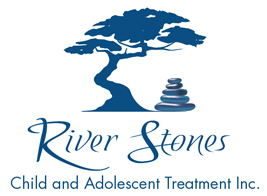CALIBRATING OUR LENSES TO SEE THE GOOD IN OUR KIDS
Russell R. Rice, MFT/CEO
River Stones Residential Treatment Inc.
In a previous article called Reversing the Ratio (riverstones.org/articles) I wrote about the how teens, especially intense ones and those with mental health issues, elicit more negative interactions than positive ones due to the amount of redirections required to steer their behavior. This is no one’s fault, it is an organic response to their intense behavior. I wrote of the profound need for parents to pay attention to this interactive ratio and shoot for a 5:1 positive to negative ratio. Less than 5:1 runs the risk of our children having a negative “ internal portfolio”, seeing themselves as damaged and broken and setting the stage for fragile parent/child relationship more vulnerable to conflict.
Our ability to succeed in this optimal interactive ratio is dependent on the lenses through which we view our children and more importantly, the lenses through which we view THE WORLD: a key factor in our overall happiness. If our lenses are not calibrated correctly, we don’t recognize our kids’ strengths and success, and more broadly, we don’t see the goodness around us and our life suffers as a result.
HOW TO CALIBRATE OUR LENSES TO BUILD OUR KIDS AND ACHIEVE MORE HAPPINESS
Our relationship with our kids and our overall life satisfaction is contingent on our ability, to see and pay attention to what is going well in any given moment. People who are absent of this ability are missing one of life’s great secrets of happiness and often suffer from pessimism at best, an unsatisfied life and depression at worst. In fact, the lack of awareness of what is going well is present in nearly allcases of depression. It’s part of what we call “depressogenic” thinking, or thinking that leads to depression. By definition, a person suffering from depression lacks the ability to focus on what is going well, and is stuck in what is not going well, what they don’t have and who they are not. Having the conscious perspective and ability to ask ourselves “What’s going well?” and being able to identify a number of real things not only guards us against depression, it manufactures a fundamental active ingredient of happiness…gratitude.
Neuroscience teaches us that what we focus on becomes our reality. There are many cultural forces that drive us toward focusing more on the negative than the positive. For example, if we buy the three lies of advertising and media: 1)we aren’t enough, 2)we don’t have enough and 3) the world is constantly getting worse, then we are focused on what ISN’T going well. Making a conscious effort to ask ourselves throughout the day “What’s going well?” and getting skilled at answering it, takes a certain set of lenses.
So the sequence goes like this: To be truly happy, we must experience a regular diet of gratitude. To be grateful we must be in tune with what is going well in the moment and in our relationships. Our ability to do this well leads to lenses that are calibrated in such a way that we can SEE and refract our kids’ strengths and success and form a healthy ratio of positive to negative interactions.
This ratio is fundamental to our kids success and their idea of who they are and their ability to feel loved.
Given that most of the kids and families we work with at River Stones are in a state of turmoil that has evolved into a destructive and negative interactive ratio, we start by disrupting that pattern by training all parents to start scanning for success and reflecting this back to their child to get their interactive ratio back to positive. “Right here, right now, you are being amazing. I see it and I appreciate it.” If our lenses are calibrated, we can see it all around us.
- Thank you for cleaning your plate without being told. That is very responsible of you.
- I know that you were upset when you lost your screen time and even though you were angry, you didn’t use foul language or break anything. You really managed your anger well.
- I noticed that you were annoyed with your little brother and yet you did a good job at ignoring him or asking for me to help without being disrespectful to him. You handled your frustration very well and shows a lot of restraint and maturity.
This is especially transformative when we focus on the areas where they struggle and find times when they are being successful in those areas and reflect it back to them. If it is anger, find times where they are managing their anger well. We usually only tell them when they aren’t managing it well. If it’s lying, find times they have been honest, tell them you notice it and reflect back your appreciation.
In future articles I will drill down on different ways to refract their success in ways that bypass their defenses and work toward building their inner portfolio and increase motivation. For now SCAN FOR SUCCESS, throughout the day in your own words tell them you see it and you appreciate it. You might be surprised at the results. It may be a bit awkward at first, but aren’t you willing to be a tad uncomfortable to build your child and better your relationship?
And don’t stop with your child-try it on your spouse and friends. I am quite confident you will like the results!!
Join me on the journey and feel free to email me questions that you would like me to address in my blogs at rrice@riverstones.org.
Russell Rice is a licensed therapist and Founder and CEO of River Stones Residential Teen Treatment in Redlands, CA that specializes in the treatment of boys ages 11-18.
Learn more at riverstones.org.



